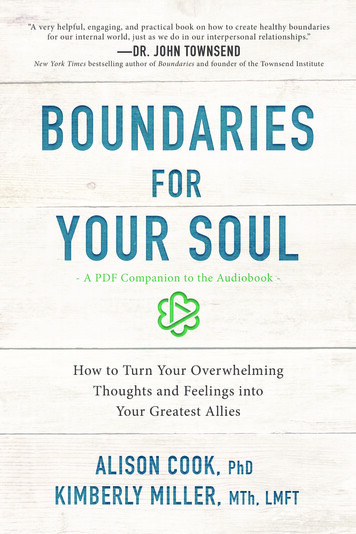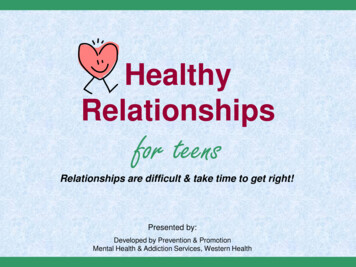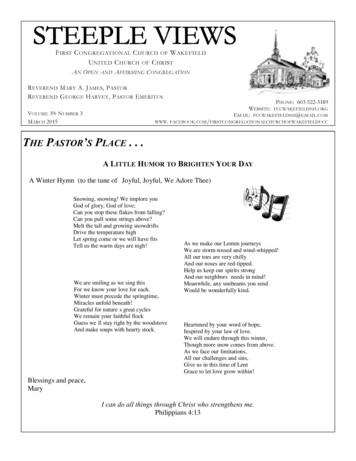
Transcription
Chapter 1WHY BOUNDARIESFOR YOUR SOUL?BOUNDA R IE S F OR YOUR S OULINTERNALBOUNDARIESQUIZto do whatI don’t reallyunderstandmyself, for I wantcloseIorfar?is Areright,yourbut emotionsI don’t do it.tooInstead,do toowhatI hate.— the apostle Paul (Romans 7:15 nlt)In each of the following scenarios, choose the answer closest tohow you would respond:facedofburnout.Hoping picturesto restoreofheryoursoul,neighbor’sshe settled1.MeganYou’re tiredseeing Facebookintoa lovely retreatcenterwith anchildren,ocean dThedelightfuldropwas everythingparties,so you: she hoped it would be. She soon discovered,however,that sittingquietlyincludingonly madeoneherofmoreUnablea. post yourbest photos,youranxious.dog jumpingthrougha flaming hulahoop, andenrollyoursheentireto quellthe competingthoughtsin hermind,gavefamilyup andin t camp.startedshow. Megandesired to rest, butb.gushtoyourneighboraboutherphotosandthank her forher racing thoughts refused to slow down.being such a blessing in your life.c. feel guilty about being envious and relieved that otherscan’t read your mind.d. noticeyour withenvy me?”and takea breakfromslouchedsocial media.“What’swrongRubenmoaned,in his counselor’s office chair. “I’m tired of falling asleep alone on the couch2. Before you were hired, your manager promised that weekendevery night.” Ruben had no difficulty attracting women, but hework wouldn’t be necessary, but today marks the fifth straightdidn’t trust himself to play the dating game without getting intoweekend he’s enlisted your help at the office. You:trouble. In fact, he was in a double bind: he longed for a meaningfula. decline and spend the weekend feeling guilty.b. show up to work but quietly3 stew as you think of yourfriends having fun without you.c. process with a friend why you’re afraid to tell your boss howyou feel.d. agree to work and then drown your sorrows with a pint ofBoundariesforYourSoul 7P.indd 34/20/18Ben & Jerry’s Chunky Monkey.3. Over lunch with friends, a member of your small group tearfully shares that last night her husband yelled at her and thenspent the night on the couch. You:a. politely excuse yourself. Public angsting makes you queasy.142:59 PM
W H Y BOUNDA R IE S F OR YOUR S OUL?b. tell her what a jerk he is and say you’ll pray for her.c. share your sadness about what happened and notice whatelse you’re feeling.d. chime in with your own stories of marriage woes.4. Your mother-in-law stops by for a visit. After leaving the kitchen momentarily, you return to find her rearranging the art onthe wall—again. You:a. bite your tongue and complain later to your spouse.b. notice your anger, consider its origin, and come up with aplan for how to address future boundary crossings.c. covet your friend’s mother-in-law who helpfully babysits.d. say you love the rearranged art while she’s still in yourhome, but then return it to its original location after sheleaves.5. You were passed over for a promotion you had been workinghard to obtain. You:a. tell yourself to get over it, even though you don’t know howto do that.b. feel sorry for yourself and wonder why things never go yourway.c. pray with a friend about your disappointment.d. daydream about ways to undermine your new boss.6. You’ve spent too much money eating out recently, and you’rehaving trouble paying off your credit card debt. You aren’t surewhether to tell your significant other. You:a. decide to face the painful feelings you’ve been avoiding bygoing on so many spending sprees.b. don’t bring up the issue. If he or she doesn’t ask, whyshould you tell?c. hyperventilate at the mere thought of your credit card bill.d. become depressed about your dwindling bank account.15BoundariesforYourSoul 7P.indd 154/20/18 2:59 PM
BOUNDA R IE S F OR YOUR S OUL7. It’s day two of a weeklong vacation, and you’re struggling.Yesterday you completed your to-do list of relaxation activities.Today you can’t stop thinking about work. You:a. call the office to check in. The team said everything will befine in your absence, but you’ll feel better if you check.b. ponder why you feel anxious whenever you’re away from work.c. stay in bed with the shutters closed and fret about all you’renot getting done.d. refrain from calling the office, but thoroughly detail yourrental car.8. You’re running late to meet friends for lunch when your significant other stops the car at a yellow light. You:a. say, “Way to save money, babe! At this rate, we can skiplunch and arrive just in time for dinner.”b. educate your significant other that yellow means “Speed up!”c. kindly share that you’re feeling anxious.d. sigh loudly, hoping to be asked what’s wrong.9. Whether you would rather take your—lately very unruly—kidswith you to the grocery store or drink from your dog’s waterbowl is a toss-up. Even so, the inevitable day has arrived. You:a. stare enviously at others’ well-behaved kids quietly walkingbeside their parents’ carts.b. resolve to be gentle with yourself even if you lose your cool.c. mutter, “Who’s been raising these kids, anyway?” as thecanned goods display topples.d. decide to bypass the mania altogether this month.McDonald’s isn’t looking so bad after all.10. Your big presentation is tomorrow, but it’s 10 p.m. and you’restill stuck on the first slide. You:a. rework the color scheme again, hoping your seventhattempt results in perfection.16BoundariesforYourSoul 7P.indd 164/20/18 2:59 PM
W H Y BOUNDA R IE S F OR YOUR S OUL?b. condemn yourself for not starting the project until now.c. resolve to call in sick tomorrow, then spend the next fourhours catching up on your favorite TV series.d. decide your presentation doesn’t have to be perfect—goodenough will do.INTERNAL BOUNDARIES QUIZ SCORING AND RESULTSScoring:Give yourself 1 point for each of the following answers:1d, 2c, 3c, 4b, 5c, 6a, 7b, 8c, 9b, 10dGive yourself 0 points for any other answer.YOUR TOTAL SCORE IS:If your total score is 0–3:You’re too far from your emotions, and this book can help!Based on your answers, you tend to avoid painful feelings. Youmight feel like a victim of your circumstances. You have difficultyspeaking up on behalf of yourself, and you often bury what youfeel and think. This book will teach you to face your emotions andturn them into powerful allies.If your total score is 4–7:Some of your emotions are too close, some are too far, and some areat a comfortable distance. Learn which emotions are troubling you,and put them to work for you!Although you work hard to manage your challenging emotions, sometimes you don’t know what to do with them and end upincreasing your anger, fear, anxiety, sadness, envy, guilt, or shame.Chapter 9 addresses anger. Anger becomes a powerful allywhen you learn to befriend it. We invite you to join us in discovering the benefits—and dangers—of your anger and how to care for17BoundariesforYourSoul 7P.indd 174/20/18 2:59 PM
BOUNDA R IE S F OR YOUR S OULits unique needs. Can you imagine turning your critic into a trustedadviser?Chapter 10 addresses fear and anxiety. It takes fear to havecourage. You can listen to your anxiety and put it to work for you.You’ll discover that when understood, these powerful feelings canpoint the way to God’s still voice within.Chapter 11 addresses sadness. You need your pain to help yougrow and develop strong spiritual roots, but you don’t need to letpain overwhelm you. When you welcome your sadness, it’s morewilling to work with you. You can set a gentle boundary with it sothat it settles peacefully into one chamber of your heart.Chapter 12 addresses envy. Can you imagine turning envy intoyour ally? Envy is a powerful emotion in response to parts of youthat might feel left out or just plain stuck. Discover how you can listen to your envy and put it to work to motivate you in healthy ways.Chapter 13 addresses guilt and shame. Is your inner critic readyto let go of the lies it has been believing? Are you ready to releasea burden of shame? It’s time to rewrite your narrative with courageous authenticity, in light of the bigger, better story that says, Youare loved.If your total score is 8–10:You have healthy boundaries with your thoughts and feelings—they’reat a comfortable distance! This book will provide you with ideas thatyou can use to help others.You’re aware of the importance of treating yourself with careand respect. You’re adept at leading yourself faithfully in partnership with God. The content in this book will help you continue toturn your overwhelming thoughts and feelings into your greatestallies. Take a look at chapter 14 for ideas about how to be patientwith the challenging parts of others and discover even greater intimacy with those you love.18BoundariesforYourSoul 7P.indd 184/20/18 2:59 PM
tian lens, because we believe that ultimately the bestthe troubled parts of your soul is to invite the HolChapter 3them. This holistic framework introduces a way tooughts, feelings, and behaviors. It’s biblical, simpleTHREE PARTS OF YOUall—it works.Every major school of psychology has acknowledgedthe mosaic nature of the human soul.— Bessel van der KolkMahtnafiggere— Psalm 86:11FirsGive me an undivided heart, that I may fear your name.er“There’s no one right framework for the soul,” said Christianpsychiatrist and author of Anatomy of the Soul, Curt Thompson.Spirit-led“What’s important is that you have a framework and that it1selfWe’ve found one that does justmakes you more like Jesus.”that. This model was developed in the 1990s, when psychologist Richard C. Schwartz noticed that people tend to talk aboutthemselves in terms of “parts.” And they describe these partsas having distinct thoughts, feelings, and character traits, likeindividual members of a family. Each part also carries its ownstory— a narrative aboutExilesits role in the person’s inner world.Based on these observations, he developed a theory called theInternal Family Systems model, or IFS. This evidence-basedmodel provides a helpful way of categorizing the distinctive partssMAP OF THE SOUL31as you’re created with specific physical traits (eyght, for example), you’re also created with differensoul. These parts develop over time. When they’rBoundariesforYourSoul 7P.indd 314/20/18 2:59 PM
are becoming whole.Change may take time, but our hope is that you’ll be motivated to pursue the lost sheep within your soul and welcome themhome. Participate in God’s work of giving you “an undividedheart” (Ezek. 11:19). ThenCyourh a pcharactert e r 8 shines; you’re the sameperson whether people are looking or not. Through the power ofthe Holy Spirit, you’re held together in your innermost being. Andyou take on life’s trials and the work God has given you to do withconfidence and grace.STEP FIVE: INTEGRATEKeep your friends close and your enemies closer.— Michael Corleone, T he G odfATher PArT IIA TOWN- HALL MEETING EXERCISEJesus knew their thoughts and said to them: “AnyImagine two partsof yourselfthat you’remostbeawarekingdomdivided againstitself willruined,of right now8taking turns atandtheamicrophonea Ttownmeeting.housefall.”S TdividedE P F I V Eat:againstINE GRitselfAThallE will— Luke 11:171. What’s the strongest feeling that you’re having?124part of Ruben felt strongly thatExample: A cautiousbe carefulwithwomen.How it’sdoimportantyou turntoyourinternalwhenrivalsinteractinginto a tlikethatyoufeeltogether? When you take a You-Turn, you focus, befriend, invite,this way?parts of yourself in need, one at a time. Now, inand unburdenBoundariesforYourSoul 7P.indd 124Example:risktakingRuben didn’this4/20/18step 5, ily.likePartscautiouspart.that wereat oddstake on new roles. It can be helpful to look for3.Whatdoesthissecondtherivalsfirst intopart friendsto know?other examples of peoplewhoparthavewantturnedandwantedRubenPerhapsto knowthethatit’sexampleimportantrecruited Example:them to beItontheir ident Abraham Lincoln.4. In response, what does the first part that spoke want thissecond part to know?Example:Ruben’scautiousTEAMpart wantedhis risk-takingPRESIDENTLINCOLN’SOF RIVALSpart to be guided by moral boundaries.Prayerfullyconsider:Jesuswant Stateto say Capitol,to bothOn5.June16, 1858,on theWhatsteps doesof theIllinoispartsLincolnof you?spoke to a nation deeply divided over slavery:Abraham111been heard, identify their comWhen both parts of you havemon goals and negotiate new strategies for working together. Arethey aware of each other’s good intentions and are they willing towork together? When the competing parts of your soul are willingBoundariesforYourSoul 7P.indd111 the same mission, well done; your (former) rivals are4/20/18to get behindbecoming a team.2:59 PM2:59 PM
MAP OF THE SOULOne of two types of protectorparts in your soul that attemptto keep you safe emotionallyand help you cope. Managerswork to keep you from pain.One of two types of protector partsin your soul that work to extinguishpain. Rather than trying to preventpain, as managers do, firefighterskick in after a painful event occurs.Activities include:Activities lashing ingsSpirit-led selfYour self led by the Spirit of ExilesThe vulnerable parts of your soul that you try to push away. Exiles areoften stuck in the past, where they hold on to painful memories.Feelings 1BoundariesforYourSoul 7P.indd 2114/20/18 2:59 PM
EXERCISE: THE FIVE STEPSHow to Take a You-Turn When You’reOverwhelmed by an EmotionYou may want to find a trusted friend, mentor, spiritual director, or professional counselor to journey with you as you embarkon the Five Steps. Even Jesus asked his friends for help when hefelt overwhelmed by his emotions (Matt. 26:36–38). This workis a process and not a onetime event. Repeat this exercise anytime a feeling starts to overwhelm you.What’s an emotion you’re experiencing right now?1. Focus Where do you sense the feeling physically? Is there a thought or image that comes to mind whenyou focus on it? How far away from you is it? What is an early memory of this feeling?2. Befriend How do you feel toward this part of your soul? If you feel anything other than curiosity or compassiontoward this emotion, notice that part of you and ask itto step back.213BoundariesforYourSoul 7P.indd 2134/20/18 2:59 PM
E X E R CI S E : T HE F I V E S T E P SReturning to the part of you that’s experiencing theoriginal emotion: Can you extend compassion to this part? Is there more it wants you to know?3. Invite Would this part like to invite Jesus to be near? If not, what are its fears and concerns? Can it tell thosethings to Jesus? Ask Jesus if he wants to say or do anything, or to give youa specific gift.4. Unburden What burden has this part been carrying? Does it have any fears about giving up that burden? Now, how does this part want to release its burden? Does this part want anything in exchange, such as peace,security, or the assurance of love?5. Integrate Check in with any part of you that didn’t like your originalemotion. What new roles do these two parts want to play in yourinternal family? Are they willing to be on the same team? Thank them and God for showing up for you today. After you’ve completed the Five Steps, set an intention tocheck back in with these parts. 214BoundariesforYourSoul 7P.indd 2144/20/18 2:59 PM
GLOSSARYBefriend: the second step in the Five Steps of taking a You-Turn.To befriend a part, your Spirit-led self extends curiosity and compassion to a part of your soul and offers the part the care it needs.Boundaries:External: lines— physical or imagined—that show whereyour legitimate sphere of influence and responsibility beginsand ends. Typically, boundaries are considered in relation topeople and external circumstances.Internal: imaginary lines that delineate the legitimate sphereof influence and responsibility of the various parts of yoursoul. Just as you can set boundaries with other people, so youcan set boundaries with your own thoughts and feelings.Healthy: clarity and harmony among the various parts of yoursoul, such that each part understands its sphere of influenceand responsibility and executes its role in a valuable, lifegiving way.Burdens: the extreme beliefs, feelings, or memories that partsof your soul take on as a result of painful experiences. You candevelop burdens anytime, but many of them were developed inchildhood when your mind couldn’t process complex experiences.215BoundariesforYourSoul 7P.indd 2154/20/18 2:59 PM
GL O S S A RYChristian: individuals who believe in and follow the teachings ofJesus Christ by accepting his gracious offer of forgiveness and livinga life of devotion to him. (See John 1:12; 3:16; Rom. 10:9; Eph. 2:8.)Comfortable Distance: the outcome of maintaining healthy boundaries with the parts that compete for power inside your soul. Beingtoo close to a troubled part leads to feeling stuck, overwhelmed, andlacking perspective. Being too far from a troubled part leads to beingvulnerable to the part ambushing as it seeks to take over the soul.Being at a comfortable distance leads to a sense of lightness and peace.Constellations (of parts): closely aligned groups of parts withinyour soul. Parts never exist in isolation, but in interrelated groups.Therefore, when you notice one troubling part, you’ll discover thatother parts are present.Creating Space: the act of the Spirit-led self asking a troubled partof the soul to relax, step back, and allow for the self to lead, andperhaps for another part to express itself. When a part steps back,you’re able to get to know it better.Differentiation: the process of distinguishing between two or morethings. You differentiate internally when you choose to createmore space between your Spirit-led self and the various parts ofyour soul. As you differentiate from these parts, you can begin tosee them with the compassion of your Spirit-led self.Exiles: vulnerable parts of your soul that harbor fear, guilt, shame,grief, loneliness, insecurities, and other painful emotions. Youmight need to ask your exiles to step back or to come closer so youcan give them the care they need. Exiles are often stuck in thepast, where they hold on to painful memories.Firefighters: one of two types of “protector” parts in your soul (seealso managers) that work to extinguish the pain of overwhelming216BoundariesforYourSoul 7P.indd 2164/20/18 2:59 PM
GL O S S A RYthoughts and feelings. Rather than trying to prevent pain, asmanagers do, firefighters kick in after a painful event occurs byindulging excessively in distracting, feel-good behavior. Becauseyou can’t numb selectively, when firefighters numb your pain,they numb your joy as well.Five Steps, the: an effective approach to setting healthy boundarieswith your soul’s troubling thoughts and feelings, so that members of your internal family can coexist harmoniously. A simplifiedand Christ-centered approach to the IFS therapy model, the FiveSteps are:Step 1: Focus on an overwhelming part of yourself.Step 2: Befriend this part you don’t like.Step 3: Invite Jesus to draw near.Step 4: Unburden this weary part.Step 5: Integrate it into your internal team of rivals.Focus: the first step in the Five Steps of taking a You-Turn. Tofocus, become curious about the strongest thought or feeling you’reexperiencing. You might notice where in your body you sense thatpart manifesting itself. In addition, you might use your God-givenimagination to envision the part. Then notice what other thoughtsor feelings you have toward the part, and ask these other parts tostep back so you can focus on the original part with curiosity andcompassion.Holy Spirit: according to Christian tradition, the third person in theTrinity is a divine person who possesses a mind, a will, and emotions. The Spirit serves as comforter and counselor to Christians.(See the book of Acts for more on the Holy Spirit, as well as Ps.139:7–8; John 14; Rom. 8:26–27; 1 Cor. 2:10–11; and Eph. 4:30.)Integrate: the fifth step in the Five Steps of taking a You-Turn.Integration occurs as your Spirit-led self guides opposing factions217BoundariesforYourSoul 7P.indd 2174/20/18 2:59 PM
GL O S S A RYwithin your soul to reconcile. To integrate, you negotiate withconflicting parts of yourself setting boundaries that support yourlife’s values, vision, mission, and goals. Integration achieves harmony among the once-adversarial parts of your internal family.Internal Allies: parts of your soul—former rivals—that have workedthrough the Five Steps and thus have begun operating collaboratively and constructively. Internal enemies transform into alliesonce troublesome parts take on new, more helpful roles. (See alsoteam of rivals.)Internal Enemies: unruly parts of your soul that you don’t like andthat battle with other parts for control of your internal family.Internal enemies are either too far from or too close to your Spiritled self.Internal Family: your soul’s parts, plus your Spirit-led self. Theseparts relate to one another much like members of a biologicalfamily—some members get along well, and others do not. Membersof your internal family need to know their roles and need the leadership of your Spirit-led self in order for you to experience innerharmony. In this book, internal family is a synonym for soul. It’s notpossible or necessary to know how many parts you have, but it’shelpful to get to know the ones most familiar to you.Internal Family Systems Model of Therapy (IFS): a fast-growing,evidence-based model of psychotherapy developed by psychologistRichard C. Schwartz. The IFS model helps individuals to workwith the different, competing parts of themselves for the purposeof freeing parts from their extreme roles, restoring trust in the“Self,” and leading the various parts so they can work togetherharmoniously.1Invite: the third step in the Five Steps of taking a You-Turn. Invitingoccurs when you welcome parts of your soul into closer relationship218BoundariesforYourSoul 7P.indd 2184/20/18 2:59 PM
GL O S S A RYwith Jesus. Typically, this occurs when you ask the part if it wouldlike him to draw near.Legacy Burdens: a type of burden attained through your family orthe culture in which you were raised.Managers: one of two types of “protector” parts in your soul (seealso firefighters) that attempt to keep you safe emotionally and helpyou cope. They’re called managers because they keep you movingforward by driving you to perform, produce, protect, and please.Managers have a survival instinct and believe it’s impractical foryou to get bogged down with pain. At their worst, if not keptwithin healthy boundary lines, they can keep you from experiencing deep-down joy and genuine connection with others.Overwhelm: an unpleasant, unnecessarily extreme experience trig-gered when an exile doesn’t receive the care it needs from yourSpirit-led self and floods your soul. In this book, for simplicity,the word also refers to times a protector takes over, or eclipses, theSpirit-led self. For this concept, Internal Family Systems uses theterm blended and psychology more broadly uses the term enmeshed.Parts: a term used in Internal Family Systems (IFS) therapy torefer to the various aspects, or states, of the human soul. Partshave their own distinct thoughts, feelings, and character traits.Each part also carries its own story—a narrative about its role.Parts develop as you grow up, and they become problematic whenthey’re hurt or traumatized. Ultimately, the goal is not to get rid ofyour soul’s parts (which would be impossible), but rather, to helpthem heal and be restored to their valuable states so they can workcollaboratively. (See also comfortable distance.)Parts Detective: an imaginary part of you that personifies yourability to detect the protective or exiled parts of other people.Employing your imaginary parts detective helps you notice, and219BoundariesforYourSoul 7P.indd 2194/20/18 2:59 PM
GL O S S A RYextend curiosity and compassion, when another person’s protectiveor exiled parts may be driving his or her unhelpful behavior.Polarized/Polarization: an internal state in which two parts “relatein opposition to or in competition with each other, to the pointwhere each party’s access to the self is constrained by fear that theother party will win or take over.”2 Polarization leads to divisionand conflict.Protectors: types of parts that attempt to protect exiled parts fromfeeling pain. There are two kinds of protector parts: managers andfirefighters.Quest for Redemption: a subconscious effort to re-create a situationin which you were wounded so that the wounded part of yourselfcan find healing or grow in some way.Self: the IFS term for your soul at its purest—the essential you—which provides leadership and has healing qualities, such ascompassion, perspective, curiosity, and confidence.Sin: missing the mark and falling short of God’s perfect, holystandards. “For all have sinned and fall short of the glory of God,and all are justified freely by his grace through the redemptionthat came by Christ Jesus” (Rom. 3:23–24). When parts are hurtor traumatized, they get forced into extreme thoughts, feelings,and roles and become more susceptible to sin.Soul: the nonphysical part of who you are, composed of your mind,will, and emotions. Used interchangeably in this book with internal family.Speaking on Behalf of a Part: setting a gentle boundary with anagitated part of your soul and sharing with others how you’re feeling, without doing harm. For example, when you speak from your220BoundariesforYourSoul 7P.indd 2204/20/18 2:59 PM
GL O S S A RYanger, you might say, “I hate you!” In contrast, when you speak onbehalf of your anger, you’re able to say, “I appreciate you, and a partof me is feeling angry right now.”Spirit-Led Self: the term used in this book for your self led by theSpirit of God. From your Spirit-led self, you can be attuned toyour troubling thoughts and emotions and give them the care theyneed. The Spirit-led self is not a part; rather, it is the core of whoyou are. Its role is to lead the parts of your soul like a symphonyconductor so that they can work harmoniously.Spirit-Led Self-Leadership: a counseling approach created by theauthors that integrates boundaries concepts with the InternalFamily Systems (IFS) model of therapy viewed through a Christianlens. The process leads hurting parts of your soul into fellowshipwith God, resulting in healthy boundaries within your soul. Thehallmark of Spirit-led self-leadership is a soul that is calm, caring,curious, compassionate, confident, connected, creative, courageous, and clear, and which exhibits the fruit of the Spirit (foundin Galatians 5).3Take Over: an unhelpful experience of a protector part of your soulexerting too much influence. This problem occurs when a protector is not working in partnership with the Spirit-led self.Team of Rivals: polarized parts of your internal family that, afterworking through the Five Steps, begin operating collaborativelywith the leadership of your Spirit-led self. The term is also thetitle of a book about President Abraham Lincoln by Doris KearnsGoodwin.Theology Inspector: an imaginary part that personifies your abilityto detect theological inaccuracies. Deploying your imaginary theology inspector helps you notice when someone is making claimsthat contradict scriptural truths.221BoundariesforYourSoul 7P.indd 2214/20/18 2:59 PM
GL O S S A RYUnburden: the fourth step in the Five Steps of taking a You-Turn.Unburdening occurs as you invite an exiled part of yourself tocast off its burdens. Parts that have been stuck in the past can beupdated and retrieved from the past, joining your Spirit-led self inthe present.Update: what happens when the Spirit-led self informs an exile ofall the strengths, resources, and wisdom your internal family hasgained over the years since the exile became stuck due to painfulcircumstances.You-Turn: a term representing the process of looking within tobring overwhelming parts of your soul under the leadership of yourSpirit-led self.4 Taking a You-Turn helps you speak with intentionality and care instead of reacting to or avoiding a difficult situation.It also helps you move from seeing your thoughts and feelings asthe problem to seeing them as part of the solution.222BoundariesforYourSoul 7P.indd 2224/20/18 2:59 PM
NOTESINTRODUCTION1. 2 Sam. 11:3.2. Henry Cloud and John Townsend, Boundaries: When to Say Yes, Howto Say No to Take Control of Your Life (Grand Rapids: Zondervan,1992), 245–46.3. For a useful summary of this model, see “Evolution of the InternalFamily Systems Model by Dr. Richard Schwartz, Ph.D.,” Centerfor Self-Leadership, accessed September 21, 2017, ystems.html.4. The Internal Family Systems (IFS) therapy model isacknowledged as “evidence-based” by the National Registry forEvidence-Based Programs and Practices. For more information,see “IFS, an Evidence-Based Practice,” Foundation News,Foundation for Self-Leadership, accessed September 29, -ifs-an-evidence-based-practice. The authors have condensed the model andadapted it from a Christian worldview.5. Dallas Willard, Renovation of the Heart: Putting on the Character ofChrist (Colorado Springs: NavPress, 2002), 27.CHAPTER 1: WHY BOUNDARIES FOR YOUR SOUL?1. Dictionary.com, s.v. “soul,” accessed August 21, 2017, http://www.dictionary.com/browse/soul?s t.2. Willard, Renovation of the Heart, 37 (see intro., n. 5).3. Dictionary.com, s.v. “boundary,” accessed August 21, 2017, http://www.dictionary.com/browse/bo
a. say, “Way to save money, babe! At this rate, we can skip . within the human soul and suggests a step-by-step approach to leading them into their most valuable states.2 This book presents an approach that integrates concepts from this IF










